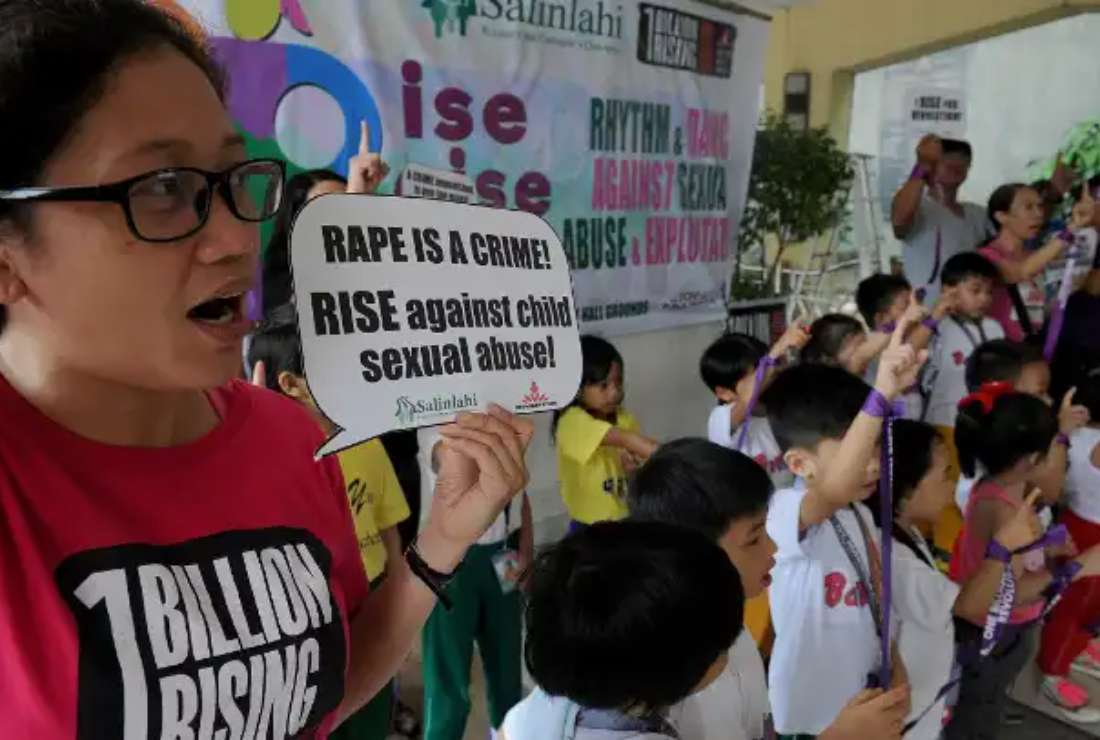

Filipino women and children take part in a dance exercise in Manila to draw attention to child sexual abuse. (Photo: AFP/ UCAN files)
Every time I sit in a Philippine family court with social workers and children who are testifying against their sexual abusers, I see many children and parents or guardians waiting for their cases to be heard by a judge.
Many other family-related cases such as adoption, petitions for guardianship, custody of children, reconciliation of spouses, family controversies and habeas corpus cases come under the jurisdiction of the family court established by law (RA 9184). There are also petitions for the declaration of the status of children as abandoned, dependent, or neglected children, and so on.Besides these, the court also deals with cases of children in conflict with the law. Many are children in violation of the dangerous drugs act. The law says a family court judge is the inspector of the government homes for the detention of minors. Family court judges are overloaded, overworked and some say underpaid. This must change.
The most important and grievous cases of all are child sexual abuse and human trafficking of children. These cases take a very long time to be heard, tried and decided by some courts with heavy workloads.
Judges, it seems, are stressed by the huge number of cases. They are meticulous in hearing evidence, retaining knowledge of the case details and conducting due diligence in summing up and writing the decisions. There are sometimes decisions as long as 15 to 20 pages. This is rightly so since a conviction for child rape means life in prison for the accused if found guilty and many are convicted.
Many more child rape cases are coming before the family courts now than before because of extensive child rights advocacy and 37 laws protecting children, besides an increase in reporting of abuse. Victims and their relatives are now realizing that justice is their right.
More cases will be reaching the family courts with the passing in March 2022 of the law increasing the age of sexual consent. The sexual molestation of a child 16 years and below is now statuary rape.
Until 2022, the age of consent was 12 years and many victims ended up being forced to testify that they “loved” the abuser, or “wanted it.” The abuser walked free to continue the abuse. That’s how the Philippine congress, made up of mostly male representatives, wanted it from 1935 until 2022. With 28 percent female representatives at present, new child protection laws have been passed.
The Philippines now needs a law establishing a "Children’s Court.”
While more cases are being filed and tried ending in more convictions, thousands of child rape cases are still not being reported. It is very important to have dedicated courts with experienced, highly-trained judges where only child abuse cases will be heard without delay.
Defense lawyers try to postpone and extend hearings so that “witness fatigue” makes the child and its supporters lose heart. The delays, if and when granted by the court, gives the defense time to pressure the child’s family into withdrawing the case, offer an out-of-court settlement, or prevent the child from appearing in court. This can lead to eroding of the trust judicial system and tarnishing its image itself.
The child continues to suffer and be threatened by the abuser if he is not already jailed or is out on bail. Aiming to prevent this, prosecutors are asking judges to order the child to be referred to children's homes for their protection and empowerment.
Some courts in Zambales and other provinces in Central Luzon are doing that at present to see that the child is cared for and justice is done. This prevents the judicial system from being manipulated and rendered useless in abuse cases.
During her recent visit to the Philippines, Mama Fatima Singhateh, the UN special rapporteur for online child abuse and child trafficking, and domestic child abuse advised that the Philippines pass a law to set up a special children’s court. She called for the creation of a court exclusively for child abuse cases, instead of having them lumped together with other cases handled by family courts.
Child sexual abuse cases “should be decided expeditiously. Delays cause trauma on victims because they get to relive their ordeal over and over again until the case is resolved,” she said.
The UN rapporteur also supported the creation of a child protection home inside the judicial system, a very urgent need that the Cebu judges are requesting the Preda Foundation to establish. Preda is presently looking for agencies and sponsors for such a therapeutic home.
The new child marriage law is soon to be implemented and Mama Fatima Singhateh said the Philippines should monitor all so-called “child marriage” abuse cases and collect data on the number of rescued children, all reported cases, and the number of convictions which, at present, is dismally very low nation-wide if any.
Prosecutors ought to request judges to order threatened and intimidated child victims to be protected, healed, and empowered in a specialized therapeutic home. This is an urgent need and dedicated lawmakers should file and present their proposed new law establishing a children’s court to deliver justice to them and make history.
*The views expressed in this article are those of the author and do not necessarily reflect the official editorial position of UCA News.
Help keep UCA News independent
The Church in Asia needs objective and independent journalism to speak the truth about the Church and the state. With a network of professionally qualified journalists and editors across Asia, UCA News is just about meeting that need. But professionalism does not come cheap. We depend on you, our readers, to help maintain our independence and seek that truth. A small donation of US$2 a month would make a big difference in our quest to achieve our goal.